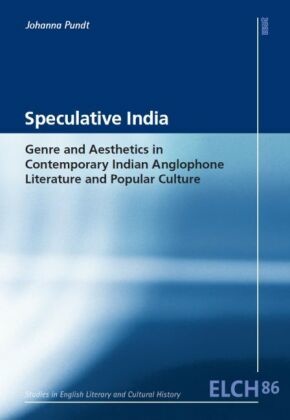Speculative India - Genre and Aesthetics in Contemporary Indian Anglophone Literature and Popular Culture
| Verlag | WVT Wissenschaftlicher Verlag Trier |
| Auflage | 2022 |
| Seiten | 272 |
| Format | 15,6 x 1,6 x 22,8 cm |
| Gewicht | 498 g |
| Artikeltyp | Englisches Buch |
| Reihe | Studies in English Literary and Cultural History (ELCH) /Studien zur Englischen Literatur- und Kulturwi |
| ISBN-10 | 3868219498 |
| EAN | 9783868219494 |
| Bestell-Nr | 86821949A |
Speculative India analyses the trans-generic mode of the speculative in Indian Anglophone literature and popular culture to dialogize established genre taxonomies with concepts of literary realism and postcolonial theory. The works analysed in this study transgress generic boundaries and combine various themes, aesthetics and techniques to centre previously marginalized worldviews, sometimes expressing perceptions that surpass the knowable and scientifically verifiable. To make sense of the liminality of works situated between the seemingly diametrically opposed extremes of realism and anti-realist fiction, this study introduces the concept of para-realism with its three formal strategies of estrangement, extrapolation and augmentation. Estrangement serves as a framework to discuss how recent speculative fiction engages with the gender dynamics of the vast Ramayana tradition. Extrapolation, in turn, is discernible in Manjula Padmanabhan's play Harvest, Priya Sarukkai Chabria's nov el Generation 14 and Vandana Singh's short story "Delhi" which envision the (posthuman) future by looking back on Indian history and hence repeatedly unsettle linear concepts of time. This ties in with the concept of augmentation as a form of enhancement, which is central to the negotiation of the chances and pitfalls of both nationalism and globalization in Rakesh Roshan's film Koi... Mil Gaya, its two Krrish sequels as well as in two of Samit Basu's superhero novels. In its use of para-realism, the speculative not only reveals its rootedness in extratextual epistemologies and ontologies but also turns into a worlding project that draws attention to the diverse experiences of being in the world.
CONTENTS
I. INTRODUCTION SPECULATIVE INDIA .................................................................. 1
Coming to Terms: Indian Anglophone Speculative Fiction .................................. 2
Creating Par a-Realism: Estrangement, Extrapolation and Augmentation .......... 10
II. THE HISTORY AND POLITICS OF SPECULATIVE FICTION ................................ 17
Speculative Fiction as 'Soft' Science Fiction ..................................................... 18
Delineating a Postcolonial Counter-Discourse.................................................... 20
Speculative Fiction and the Fantastic .................................................................. 24
Debating (Im-)Possibility .................................................................................... 27
The Formation of Para-Realism .......................................................................... 28
III. FAMILIARIZATION AND ESTRANGEMENT IN CONTEMPORARY RAMAYANAS ... 34
Estranging the Familiar, Familiarizing the Strange ............................................. 34
The Ramayana Tradition: Contexts and Contestations ....................................... 37
Sita in Speculative Fiction .................................................................................. 46
3.1 Vedic Ideals in Future Contexts: The Ramayan 3392 A.D. Comics ................... 48
Familiar Characters in an Estranged World ........................................................ 49
Disciplining Seeta ............................................................................................... 54
'Being Sita' in the Future .................................................................................... 59
3.2 Finding Sita in Samhita Arni's The Missing Queen ............................................ 61
Speculative Fiction and Formal Estrangement .................................................... 62
The Unknowable Si

